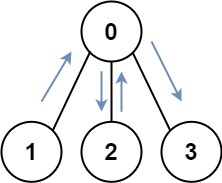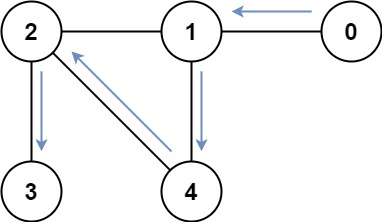Problem
You have an undirected, connected graph of n nodes labeled from 0 to n - 1. You are given an array graph where graph[i] is a list of all the nodes connected with node i by an edge.
Return the length of the shortest path that visits every node. You may start and stop at any node, you may revisit nodes multiple times, and you may reuse edges.
Example 1:

Input: graph = [[1,2,3],[0],[0],[0]]
Output: 4
Explanation: One possible path is [1,0,2,0,3]
Example 2:

Input: graph = [[1],[0,2,4],[1,3,4],[2],[1,2]]
Output: 4
Explanation: One possible path is [0,1,4,2,3]
Constraints:
n == graph.length1 <= n <= 120 <= graph[i].length < ngraph[i]does not containi.If
graph[a]containsb, thengraph[b]containsa.The input graph is always connected.
Solution
class Solution {
public int shortestPathLength(int[][] graph) {
int target = (1 << graph.length) - 1;
Queue<int[]> q = new ArrayDeque<>();
for (int i = 0; i < graph.length; ++i) {
q.offer(new int[] {i, 1 << i});
}
int steps = 0;
boolean[][] visited = new boolean[graph.length][target + 1];
while (!q.isEmpty()) {
int size = q.size();
for (int i = 0; i < size; ++i) {
int[] curr = q.poll();
int currNode = Objects.requireNonNull(curr)[0];
int currState = curr[1];
if (currState == target) {
return steps;
}
for (int n : graph[currNode]) {
int newState = currState | 1 << n;
if (visited[n][newState]) {
continue;
}
visited[n][newState] = true;
q.offer(new int[] {n, newState});
}
}
++steps;
}
return -1;
}
}
Explain:
nope.
Complexity:
- Time complexity : O(n).
- Space complexity : O(n).